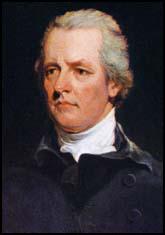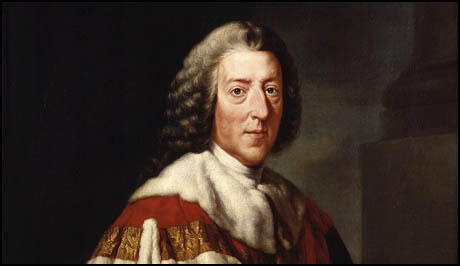William Pitt the Younger

William Pitt was born at Hayes, Kent on 28th May 1759. He suffered from poor health and was educated at home. His father, William Pitt, Earl of Chatham, was the former M.P. for Old Sarum and one of the most important politicians of the period. The Earl of Chatham was determined that his son would eventually become a member of the House of Commons and at an early age William was given lessons on how to become an effective orator.
When William was fourteen he was sent to Pembroke Hall, Cambridge. His health remained poor and he spent most of the time with his tutor, the Rev. George Pretyman. William, who studied Latin and Greek, received his M.A. in 1776.
William grew up with a strong interest in politics and spent much of his spare time watching debates in parliament. On 7th April 1778 he was present when his father collapsed while making a speech in the House of Lords and helped to carry his dying father from the chamber.
In 1781 Sir James Lowther arranged for William Pitt to become the M.P. for Appleby. He made his first speech in the House of Commons on 26th February, 1781. William Pitt had been well trained and afterwards, Lord North, the prime minister, described it as the "best speech" that he had ever heard.
Soon after entering the Commons, William Pitt came under the influence of Charles Fox, Britain's leading Whig politician. Pitt joined Fox in his campaign for peace with the American colonies. On 12th June he made a speech where Pitt insisted that this was an "unjust war" and urged Lord North's government to bring it to an end.
Pitt also took an interest in the way that Britain elected Members of Parliament. He was especially critical of the way that the monarchy used the system to influence those in Parliament. Pitt argued that parliamentary reform was necessary for the preservation of liberty. In June 1782 Pitt supported a motion for shortening the duration of parliament and for measures that would reduce the chances of government ministers being bribed.

When Lord Frederick North's government fell in March 1782, Charles Fox became Foreign Secretary in Rockingham's Whig government. Fox left the government in July 1782, as he was unwilling to serve under the new prime minister, Lord Sherburne. Short of people willing to serve him, Sherburne appointed the twenty-three year old Pitt as his Chancellor of the Exchequer. Fox interpreted Pitt's acceptance of this post as a betrayal and after this the two men became bitter enemies.
On the 31st March, 1783, Pitt resigned and declared that he was "unconnected with any party whatever". Now out of power, Pitt turned his attention once more to parliamentary reform. On 7th May he proposed a plan that included: (1) checking bribery at elections; (2) disfranchising corrupt constituencies; (3) adding to the number of members for London. His proposals were defeated by 293 to 149. Another bill that he introduced on 2nd June for restricting abuses in public office was passed by the House of Commons but rejected by the House of Lords.
In Parliament he opposed Charles Fox's India Bill. Fox responded by making fun of Pitt's youth and inexperience and accusing him of following "the headlong course of ambition". George III was furious when the India Bill was passed by the House of Commons. The king warned members of the House of Lords that he would regard any one who voted for the bill as his enemy. Unwilling to upset the king, the Lords rejected the bill by 95 votes to 76.
The Duke of Portland's administration resigned and on 19th December, 1783, the king invited William Pitt to form a new government. At the age of only twenty-four, Pitt became Britain's youngest prime minister. When it was announced that Pitt had accepted the king's invitation, the news was received in the House of Commons with derisive laughter.
Pitt had great difficulty finding enough people to join his government. Except for himself, his cabinet of seven contained no members of the House of Commons. Charles Fox led the attack on Pitt and although defeated in votes several times in the Commons, he refused to resign. After building up his popularity in the country, Pitt called a general election on 24th March, 1784. Pitt's timing was perfect and 160 of Fox's supporters were defeated at the polls. Pitt himself stood for the seat of Cambridge University.
Pitt now had a majority in the House of Commons and was able to persuade parliament to pass a series of measures including the India Act that established dual control of the East India Company. Pitt also attacked the serious problem of smuggling by reducing duties on those goods that were mainly being imported illegally into Britain. The success of this measure established his reputation as a shrewd politician.
In April 1785 Pitt proposed a bill that would bring an end to thirty-six rotten boroughs and to transfer the seventy-two seats to those areas where the population was growing. Although Pitt spoke in favour of reform, he refused to warn the House of Commons that he would resign if the measure was defeated. The Commons came to the conclusion that Pitt did not feel strongly about reform and when the vote was taken it was defeated by 248 votes to 174. Pitt accepted the decision of the Commons and never made another attempt to introduce parliamentary reform.
The general election of October 1790 gave Pitt's government an increased majority. For the next few years Pitt was occupied with Britain's relationship with France. Pitt had initially viewed the French Revolution as a domestic issue which did not concern Britain. However, Pitt became worried when parliamentary reform groups in Britain appeared to be in contact with French revolutionaries. Pitt responded by issuing a proclamation against seditious writings.
When Pitt heard that King Louis XVI had been executed in January 1793, he expelled the French Ambassador. In the House of Common's Charles Fox and his small group of supporters attacked Pitt for not doing enough to preserve peace with France. Fox therefore blamed Pitt when France declared war on Britain on 1st February, 1793.
Pitt's attitude towards political reform changed dramatically after war was declared. In May 1793 Pitt brought in a bill suspending Habeas Corpus. Although denounced by Charles Fox and his supporters, the bill was passed by the House of Commons in twenty-four hours. Those advocating parliamentary reform were arrested and charged with sedition. Tom Paine managed to escape but others such as Thomas Hardy, John Thellwall and Thomas Muir were imprisoned.
Pitt decided to form a great European coalition against France and between March and October 1793 he concluded alliances with Russia, Prussia, Austria, Spain, Portugal and some German princes. At first these tactics were successful but during 1794 Britain and her allies suffered a series of defeats. To pay for the war, Pitt was forced to increase taxation and to raise a loan of £18 million. This problem was made worse by a series of bad harvests. When going to open parliament in October 1795, George III was greeted with cries of 'Bread', 'Peace' and 'no Pitt'. Missiles were also thrown and so Pitt immediately decided to pass a new Sedition Bill that redefined the law of treason.
Britain's continuing financial difficulties convinced Pitt to seek peace with France. These peace proposals were rejected by the French in May 1796 and William Pitt once again had to introduce new taxes. This included duties on horses and tobacco. The following year Pitt introduced additional taxes on tea, sugar and spirits. Even so, by November 1797, Britain had a budget deficit of £22 million. On several occasions Pitt was in physical danger from angry mobs and he had to be constantly protected by an armed guard. Pitt's health began to deteriorate and newspapers began reporting that the prime minister had suffered a mental breakdown and was insane. Pitt responded by passing new laws that enabled the government to suppress and regulate newspapers.
Britain's financial problems continued and in his budget of December 1798 William Pitt introduced a new graduated income tax. Beginning with a 120th tax on incomes of £60 and rising by degrees until it reached 10% on incomes of over £200. Pitt believed that this income tax would raise £10 million but in fact in 1799 the yield was just over £6 million.
In 1797 Pitt appointed Lord Castlereagh as his Irish chief secretary. This was a time of great turmoil in Ireland and in the following year Castlereagh played an important role in crushing the Irish uprising. Castlereagh and Pitt became convinced that the best way of dealing with the religious conflicts in Ireland was to unite the country with the rest of Britain under a single Parliament. The policy was unpopular with the borough proprietors and the members of the Irish Parliament who had spent large sums of money purchasing their seats. Castlereagh appealed to the Catholic majority and made it clear that after the Act of Union the government would grant them legal equality with the Protestant minority. After the government paid compensation to the borough proprietors and promising pensions, official posts and titles to members of the Irish Parliament, the Act of Union was passed in 1801.
George III disagreed with Pitt and Castlereagh's policy of Catholic Emancipation. When Pitt discovered that the king had approached Henry Addington to become his prime minister, he resigned from office. Although Pitt had been paid £10,500 a year as prime minister, he was now deeply in debt and for a while he feared that he would be declared bankrupt. A group of friends agreed to help but it was only after selling his family home that he was able to satisfy his creditors.
In May 1804 Henry Addington resigned from office and once again William Pitt became prime minister. Lord Castlereagh was appointed Secretary for War but many leading politicians, including Charles Fox, refused to serve under Pitt. Out of the twelve man cabinet, only Pitt and Castlereagh were from the House of Commons.
With Napoleon planning to invade England, Pitt quickly formed a new coalition with Russia, Austria and Sweden. When the French were defeated at the Battle of Trafalgar on 21st October 1805, Pitt was hailed as the savior of Europe. However, Napoleon fought back and in December, 1805 he triumphed over the Russians and Austrians at Austerlitz.
Pitt was devastated by the news of Napoleon's victory and soon after was taken seriously ill. William Pitt died on 16th January, 1806. He was so heavily in debt that the House of Commons had to raise £40,000 to pay off his creditors.
Slavery in the United States (£1.29)


